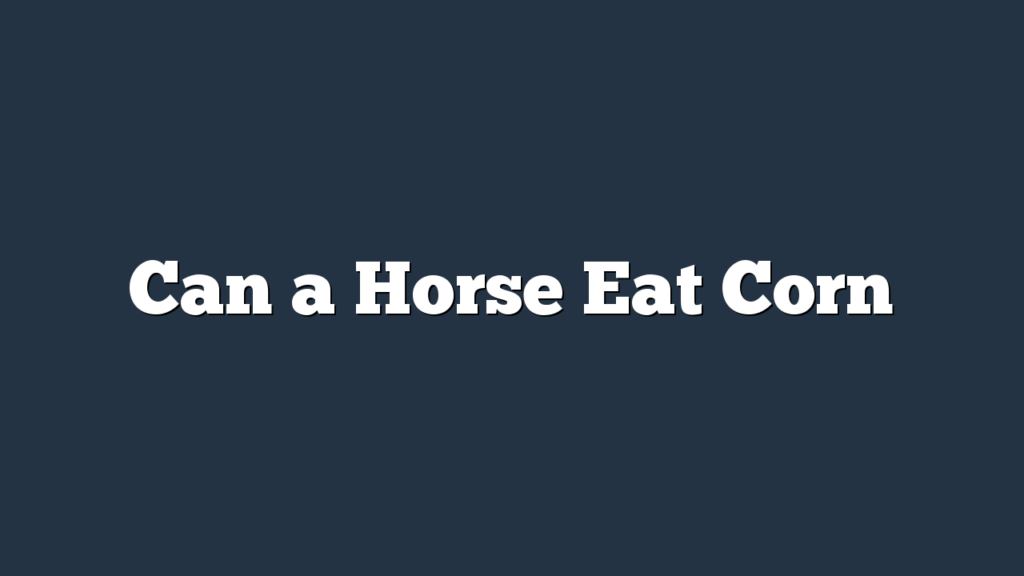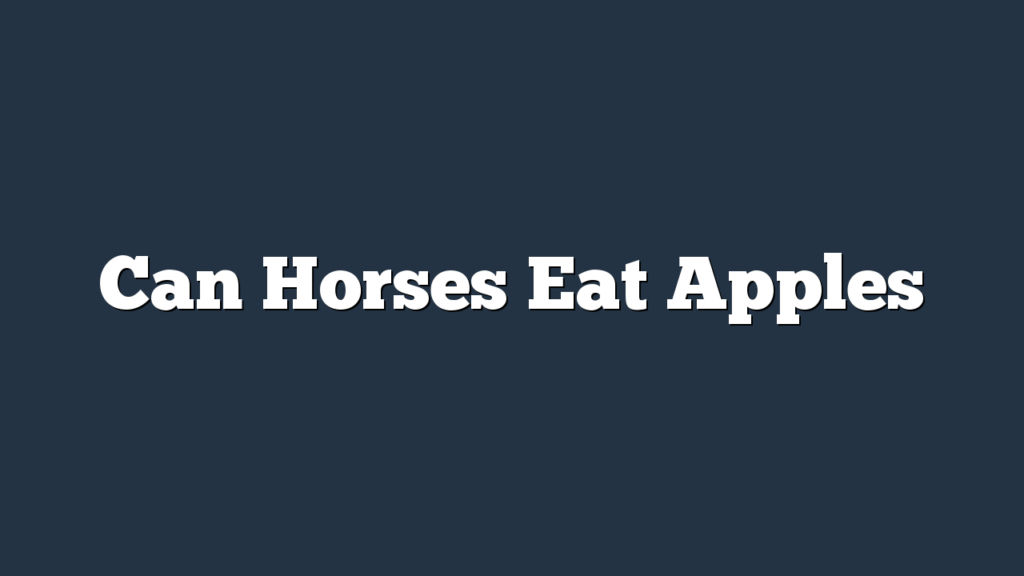Wondering if your horse can munch on corn on the cob? Find out here!
Discover the nutritional value of corn for horses and how their digestive system handles it.
Learn about the potential risks and the importance of moderation and portion control.
We’ll also explore alternatives to corn on the cob for your equine friend.
Don’t miss out on this informative article about horses and corn consumption.
Nutritional Value of Corn for Horses
You can find out the nutritional value of corn for horses by examining its composition and analyzing its benefits as a feed option.
Corn is a popular feed choice for horses due to its numerous benefits. It’s a good source of energy, providing high levels of carbohydrates that can fuel your horse’s activities. Additionally, corn contains essential nutrients such as protein, fiber, and vitamins, including vitamin A and vitamin E, which are vital for your horse’s overall health and well-being.
One of the main benefits of corn for horses is its digestibility. Corn is easily broken down in the horse’s digestive system, allowing for efficient absorption of nutrients. However, it’s important to note that while corn can be a valuable feed option, excessive consumption can lead to potential digestive issues. Corn is high in starch, and if fed in large quantities without proper moderation, it can disrupt the horse’s delicate gut flora and result in digestive upset, including colic and laminitis.
To prevent digestive issues, it’s crucial to introduce corn gradually into your horse’s diet and monitor their response. It’s also recommended to balance corn with other forages and feed options to ensure a well-rounded and balanced diet for your horse.
Digestive System and Corn Consumption
When feeding corn to horses, it’s important to understand how their digestive system handles corn consumption. Horses have a unique digestive system that’s designed to efficiently process and extract nutrients from forage. Here’s how their digestive system handles corn digestion:
- Stomach: Horses have a relatively small stomach compared to their size, which means they’ve limited capacity to process large amounts of corn. The high starch content in corn can also lead to a higher risk of gastric ulcers in horses.
- Small intestine: The small intestine is where most of the nutrient absorption takes place. Corn is rich in carbohydrates, which are broken down into sugars during digestion. Horses can efficiently utilize these sugars for energy.
- Large intestine: Horses have a large cecum and colon, which are responsible for fermenting fiber. While corn isn’t a significant source of fiber, it can still be digested to some extent in the large intestine. However, excessive corn consumption can disrupt the balance of the hindgut, leading to digestive issues such as colic.
Despite the potential risks, corn can provide some benefits for horses when fed in moderation. It can be a valuable source of energy, especially for performance horses or those with high energy requirements. However, it should always be introduced gradually and monitored closely to ensure the horse’s digestive system can handle it properly.
Potential Risks of Feeding Corn on the Cob to Horses
Feeding corn on the cob to horses can pose potential risks due to their unique digestive system and limited ability to process large amounts of corn. One of the main concerns is the potential choking hazards that corn on the cob presents to horses. Unlike humans, horses can’t chew their food fully before swallowing. The cob’s hard texture and irregular shape can increase the risk of obstruction in their esophagus or gastrointestinal tract, leading to serious health issues.
It’s important to note that horses have different dental structures compared to humans. Their teeth continuously grow, and they rely on a grinding motion to break down their food. Corn on the cob’s hard kernels can cause dental issues such as broken teeth, gum injuries, or even impaction. These problems can affect the horse’s ability to eat properly and may require veterinary intervention.
Therefore, it’s crucial to consider the potential risks before feeding corn on the cob to horses and opt for safer alternatives that are easier for them to digest.
Moderation and Portion Control for Corn Feeding
To ensure the safety and health of your horse, how can corn feeding be approached with moderation and portion control? It’s important to consider the portion sizes and the method of corn husk removal when feeding corn to your horse. Here are three key points to keep in mind:
- Portion sizes: It’s crucial to feed corn in moderation. Horses have sensitive digestive systems, and too much corn can cause digestive issues such as colic or laminitis. Start by offering small amounts of corn and monitor your horse’s reaction. Gradually increase the portion size if your horse tolerates it well. However, it’s always best to consult with a veterinarian or equine nutritionist to determine the appropriate portion size for your horse based on their specific needs and health condition.
- Corn husk removal: Before feeding corn to your horse, ensure that the husk is removed. Horses are unable to properly digest the fibrous husk, and it can pose a choking hazard. Remove the husk completely to reduce the risk of choking and to make digestion easier for your horse.
- Balanced diet: While corn can be an occasional treat for horses, it should never replace their regular balanced diet. Horses require a variety of nutrients from different sources to maintain their overall health. Corn should only be a small part of their diet and should be supplemented with high-quality forage, grains, and essential minerals and vitamins.
Alternatives to Corn on the Cob for Horses
If you’re looking for options other than corn on the cob to feed your horse, consider the following alternatives. It’s important to find horse feed options that are suitable for a corn-free diet. Here are some alternatives to corn on the cob that you can consider:
| Alternatives | Benefits |
|---|---|
| Oats | Provide energy and are easily digestible |
| Barley | High in fiber and can help with digestion |
| Beet Pulp | Excellent source of fiber and can help with weight gain |
| Rice Bran | High fat content and can provide additional calories |
These alternatives can be a great addition to your horse’s diet, especially if you’re looking to eliminate corn. Each option provides different benefits, so you can choose the one that suits your horse’s needs the best. Make sure to consult with your veterinarian or equine nutritionist to determine the right amount and ratio of these alternatives for your horse. Remember, a balanced diet is essential for your horse’s overall health and well-being.
Final Thoughts on Horses and Corn Consumption
Although horses may enjoy the taste of corn on the cob, it’s important to consider the potential risks and limitations of their corn consumption. While corn can provide some nutritional benefits for horses, it shouldn’t be their main source of food. Here are some final thoughts to keep in mind when it comes to horses and corn consumption:
- Horse health benefits: Corn can be a good source of energy for horses due to its high carbohydrate content. It can also provide some essential nutrients like vitamin E and beta-carotene. However, it’s crucial to balance their diet with other forage and concentrates to ensure they receive a well-rounded nutrition.
- Corn cob safety: Although horses may be tempted to chew on corn cobs, it’s important to prevent them from doing so. Corn cobs can pose a choking hazard and may cause blockages in the digestive system if ingested. Always remove the corn from the cob before feeding it to your horse.
- Moderation is key: While horses can enjoy corn as an occasional treat, it shouldn’t make up a significant portion of their diet. Too much corn can lead to weight gain, digestive issues, and an imbalance in their overall nutrition.
Frequently Asked Questions
Can Horses Eat Corn Kernels Instead of Corn on the Cob?
As part of a horse’s diet, it’s important to consider alternatives to corn. While corn kernels are a suitable option, it’s crucial to ensure they are properly prepared and fed in moderation.
How Often Should Corn on the Cob Be Fed to Horses?
Corn on the cob should be fed to horses in moderation. While it can provide some nutritional value, too much can lead to digestive issues like colic. Compare its nutritional value to other grains commonly fed to horses.
Are There Any Health Benefits to Feeding Corn on the Cob to Horses?
There are health benefits to feeding corn on the cob to horses. It provides nutritional value and can be a tasty treat. However, moderation is key to avoid digestive issues.
Can Corn on the Cob Cause Digestive Issues in Horses?
Digestive issues can occur if horses eat corn on the cob. It poses potential dangers because the cob is difficult to digest and can cause blockages or choking hazards.
What Are Some Other Vegetables or Grains That Can Be Fed to Horses Instead of Corn on the Cob?
When it comes to feeding horses vegetables, there are plenty of options to consider. Carrots, celery, and lettuce are all good choices. As for grains, oats and barley are commonly fed to horses.
Conclusion
In conclusion, while horses can technically eat corn on the cob, it isn’t recommended due to its low nutritional value and potential risks. Corn should only be fed to horses in moderation and with portion control.
It’s important to consider alternatives to corn on the cob that provide better nutrition for horses. Overall, it’s best to consult with a veterinarian or equine nutritionist to ensure your horse’s diet is balanced and meets their specific needs.



